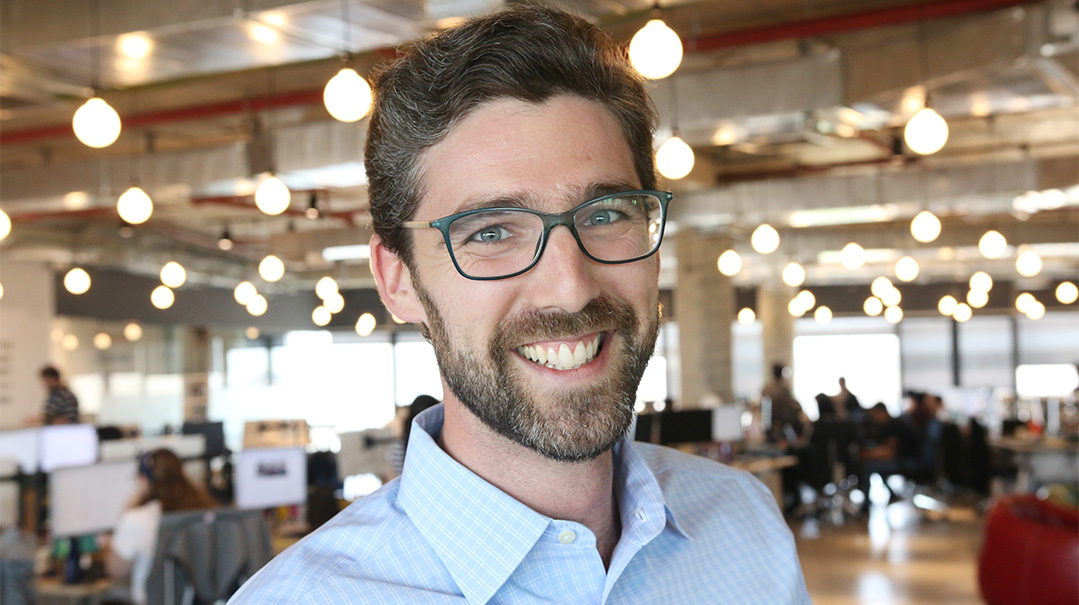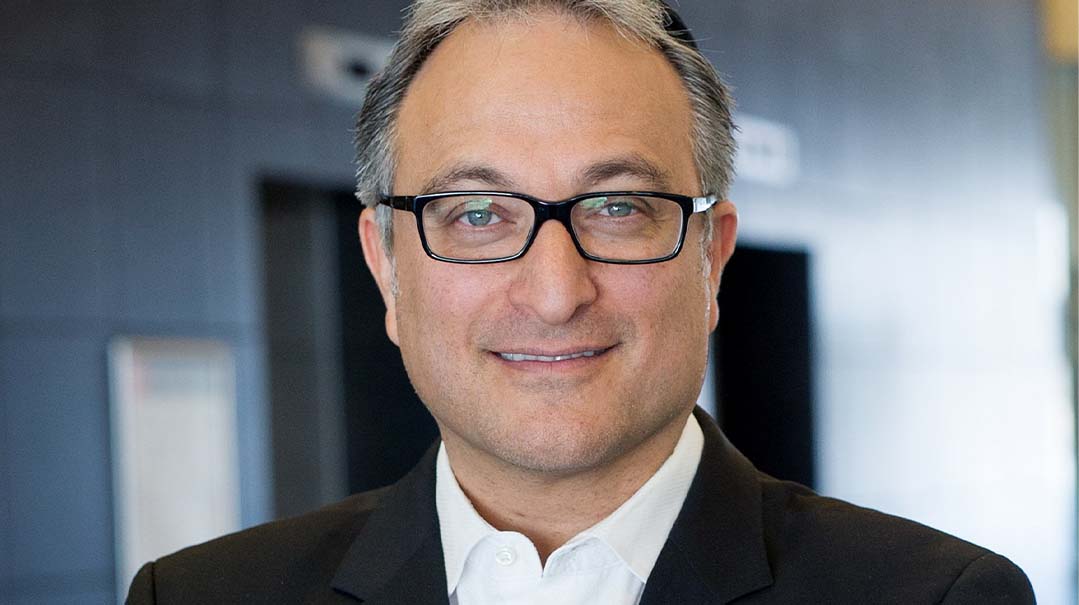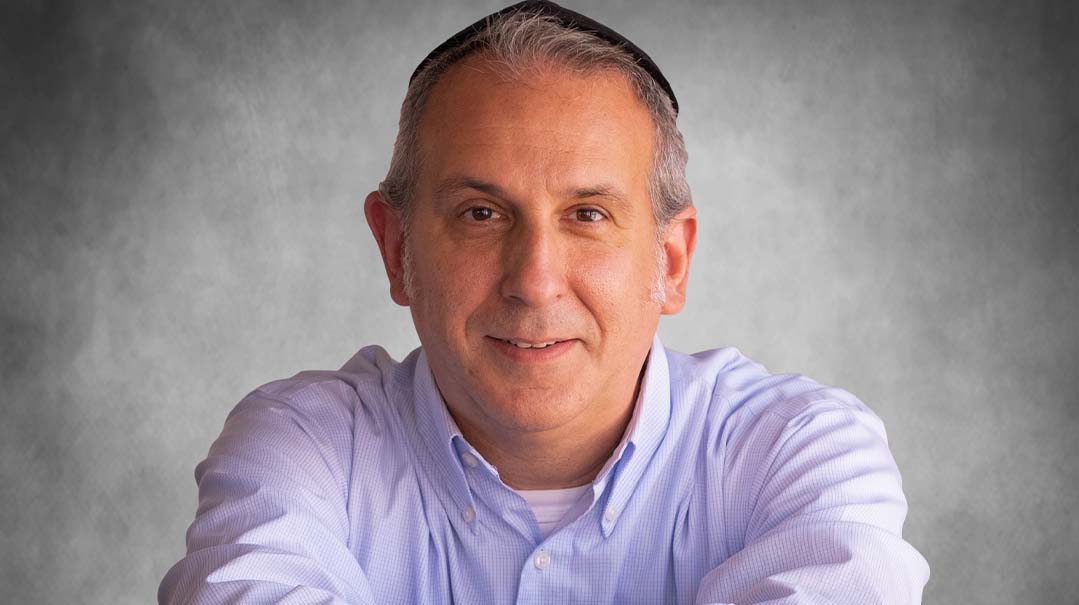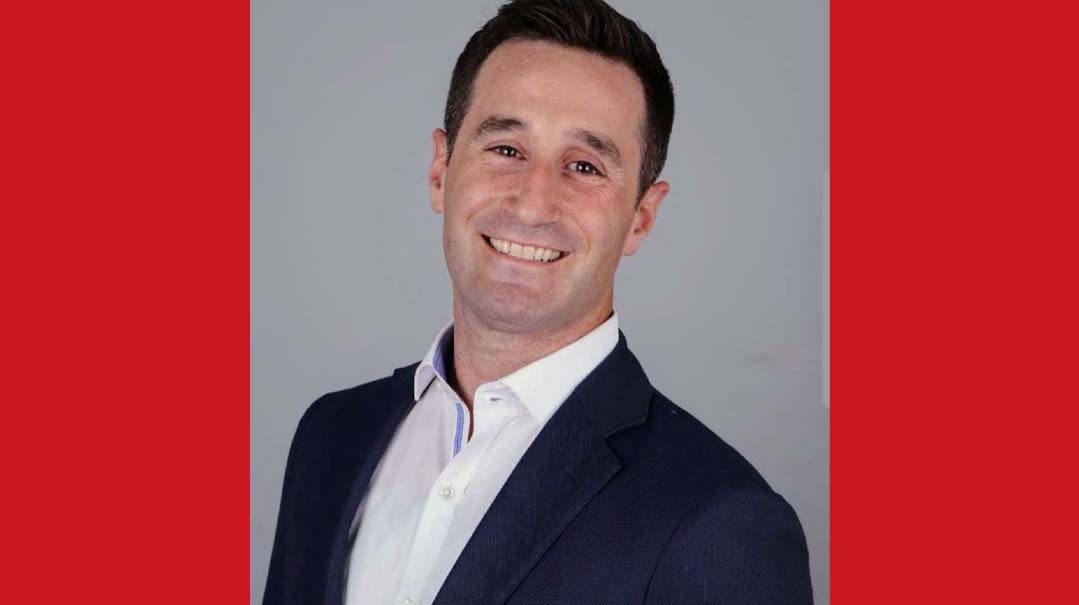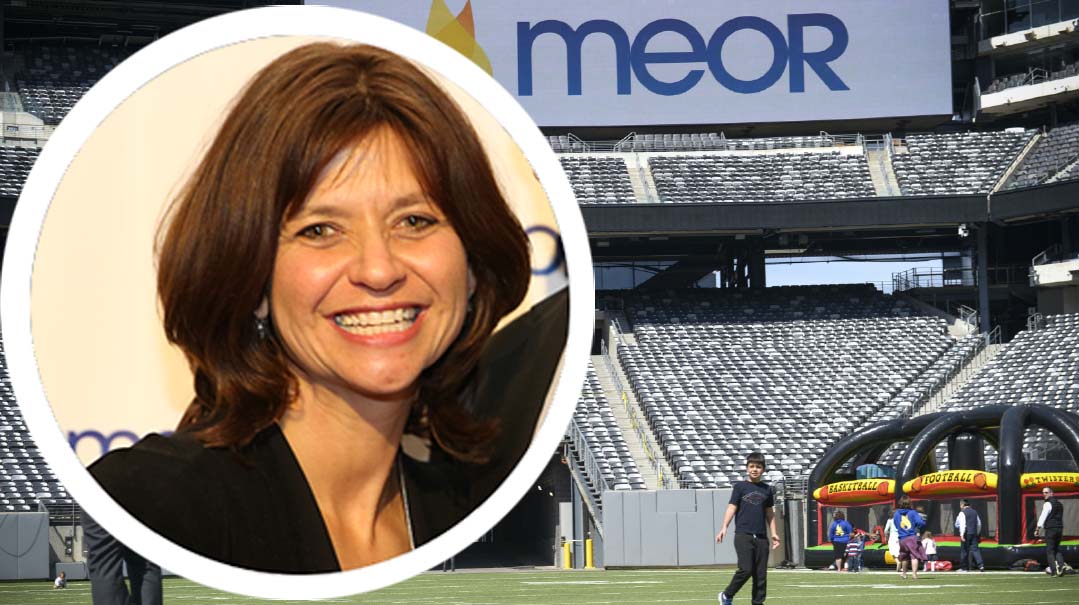Work/Life Solutions with Ari Tolwin

"Focus on doing what you love, and everything else will fall into place"
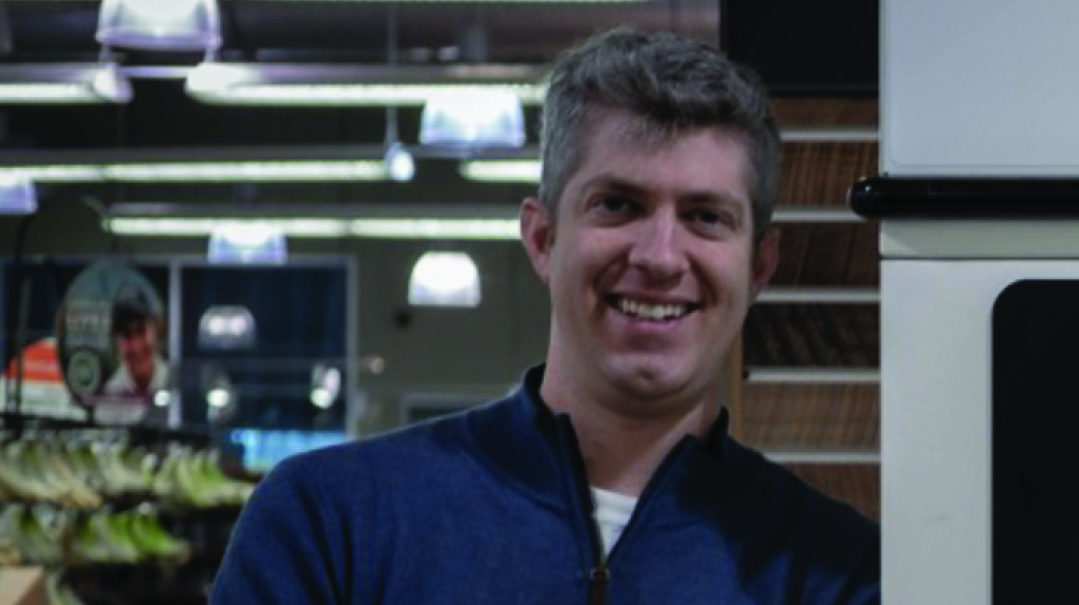
Who: Ari Tolwin, co-founder & CEO at NuMilk
What: NuMilk is a revolutionary dairy-free milk machine used by grocery stores and coffee shops arounds the country. Customers grab an empty bottle, press a button, and in about 30 seconds, they have fresh, clean plant-based milk with no chemicals, gums or preservatives. NuMilk is Ari’s second entrepreneurial food and beverage venture; prior to that, he worked as a consultant at McKinsey & Company. He received a BA from the University of Pennsylvania and an MBA from Duke.
Where: Ari grew up in Oak Park, Michigan, attended Darchei Torah yeshivah and Yeshiva Gedolah Ateres Mordechai, and currently lives in the Williamsburg neighborhood of Brooklyn, New York.
Why: Ari made international news a few weeks ago, when NuMilk was featured on Shark Tank and Ari struck a $2 million deal with billionaire Mark Cuban (who is Jewish as well). That piqued my interest. I was impressed to see how Ari makes a kiddush Hashem in his professional endeavors, weaves Torah sources into his conversations, and is channeling his entrepreneurial spirit to transform plant-based milk into something nutritious and delicious, and fresher and healthier than standard products. And while NuMilk’s store machines do not have a hechsher (it is produced fresh in the store where there’s no supervision, although all ingredients are raw and plant-based), their soon-to-be-released home countertop machine’s milk packets will have one.
1 of 9 What opportunities or personalities played a key role in your career path?
My older brother Chaim has always been very conscientious, connected to nature, with a strong drive for self-sufficiency. In 2013, while working as a consultant at McKinsey in NYC, I visited him and his family in the Catskills. He was making maple syrup from the maple trees on his property that he had tapped. I had no idea how real maple syrup was made, so he explained to me that we insert a tap — visualize a small metal straw — into the maple tree, collect the slightly sweet water that flows up its roots and through its trunk, and then… wait, there’s water in a maple tree? Can we drink it? “Of course,” Chaim said. “Native Americans drank it as a health tonic, as do people today in South Korea.” From there, my first foray into food and beverage began, with the creation of my maple water brand. While maple water has not enjoyed significant commercial success, it’s one of nature’s amazing products and maybe one day it will have its day.
Then, about four years ago, a friend and I were talking and asked ourselves: What if we could revolutionize plant-based milk to make it waste-free, pure, nutritious and delicious — better for our taste buds, health, and better for the environment?
We love almond milk, and oat milk, and plant-based lattes and protein shakes. But we don’t like buying pre-packaged plant-based milks that have been sitting in supply chains, or that contain gums, fillers, and/or preservatives. Plus, they just don’t taste very good.
So we decided to do something about it. With NuMilk, you make your own clean plant-based milks, lattes and protein-based shakes in less than a minute. We started in Whole Foods with large banner machines that make the best plant-based milk immediately right on-site. It’s delicious, nutritious, eliminates nearly all waste, and is much better for the environment with reusable consumer packaging and 90% less product shipping weight. Since launching with Whole Foods two years ago, our grocery machines have been very well received. We were ecstatic with the reception, but our vision was to bring the freshest plant-based milks to people everywhere, including at home. And so, in 2020, we rolled out our countertop NuMilk Professional designed specifically for use in cafes, and early next year, we will be launching NuMilk Home for kitchen counters everywhere.
2 of 9 Which three character traits have played a key role in your success?
I’d like to focus on one character trait that has been key in my career: ambition. However, I’d like to qualify that not all ambition is the same. My ambition is not personal greed, but to create personal impact — I want to make an impact whenever, wherever. My ambition is collective: how can I make a difference? And it’s not anything I can take credit for — maybe it’s just the result of being younger in a large family, or growing up in a warm and supportive community.
I met my co-founder at NuMilk, Joe Savino, while we were each delivering our products to a bagel shop on the Lower East side: my maple water and his juice. We knew of each other in the food and beverage industry in New York, but had never met. Still, we recognized each other by our products and said hi. Immediately, the conversation turned to what we were working on and how we could help each other. We started sharing all the buyer and account information that we each had. For example, his products were in Fairway and mine weren’t. He passed along the Fairway buyers contact info, I emailed them immediately, was able to meet with them later that day, and they started carrying my maple water. We were open with each other and completely focused on how we could create a positive impact as opposed to personal benefit. We both benefited from that initial exchange, and still benefit today as partners on our NuMilk journey. Thankfully, my ambition actualizes as a desire for impact as opposed to greed. My goal is to make a positive impact; personal success will follow.
6 of 9 What is the most inspiring feedback you’ve ever received? Did that impact what you did next?
I was about 25 years old and working in real estate in Detroit. Through a connection from my father, I met with a successful real estate investor named Lionel Margolick to pick his brain and get some real estate advice. About 15 minutes into chatting, Lionel said to me, “You’re a smart guy but you’re stuck in Detroit. Why don’t you go to business school?” At that point, my college career consisted of 1 B, 1 C, 2 F’s, and 2 W’s from Oakland County Community College. I explained, to his surprise, that I didn’t have an undergrad degree. “Go to undergrad and then go to business school. You can have financial success here in real estate but you’ll always be a villager, without an educated and broad perspective.”
He was right. I was a villager, acting on the basis of inertia instead of free choice. Like a golem I listened, got an undergrad degree, and then an MBA. Lionel wasn’t the first person to suggest I attend college — my mother had been saying it for years. But for whatever reason, hearing it from someone in my real estate world finally triggered something in me to act. And in hindsight, this was the best financial decision of my life.
Fast forward a few years: Getting an award on Shark Tank was beyond my wildest dreams, and further validation of my path. The application process was about five months in total, as they choose 120 out of 30,000 applicants. With those odds, I figured I’d need to know someone who worked in the kitchen, but I didn’t. So we simply applied through the standard form on the website, and about a week or so later a real live human being reached out to us. We were pretty shocked, but from there, we knew we had a shot.
Once we passed our initial pitch, it became a more typical investment conversation, albeit with slight undertones of a firing squad. In the moment, we actually missed the plentiful signs that Mark was interested, from the obvious — like effusive praise of our almond milk, to the subtle — his unusually quiet, observing demeanor. By the end, when Joe and I were too exhausted to string together coherent sentences, he swooped in and made his offer, brushing aside my feeble attempts to negotiate and striking a deal: ten percent of NuMillk.
8 of 9 How do you navigate the tension between your deepest values and the business world?
In the frum world, we all pay so much attention to detail that it becomes second nature. We even have a specific way to tie our shoes. For me, that has always translated into a desire for a formulaic approach and intellectual elegance even for things that, quite frankly, don’t really matter. It’s a noble concept, but outside of religious practice, caring about minutiae is not really valued. In my professional career, there have been times where I’ve negotiated with colleagues, investors, and business partners about details where my logic was correct, but I missed the bigger picture. Some things may just not be worth a discussion. It’s the 80/20 rule: 80% of the benefit can be achieved with 20% of the effort, and the remaining possible 20% of benefit requires 80% of the effort. This is a constant struggle — I care deeply, but oftentimes letting go is best.
9 of 9 If you were advising a young man/woman hoping to launch a career as an entrepreneur, which “dos” and “don’ts” would you share?
Entrepreneurship is not a career. The question is not, do I want to work for a company or do I want to start my own business. Instead, ask: What do I love and how can I spend time doing it? For some people, their love aligns exclusively with starting something on their own, and they become entrepreneurs or even serial entrepreneurs. For others, they love something that isn’t yet commercialized, so they go and create it. Others may be entrepreneurial in skillset but love something that already exists — like IPhones, or Duncan Hines brownie mix, or Costco (I love Costco and I could never do Costco better than Costco does Costco), or photography equipment at B&H — and if that is the case, go work there. Focus on doing what you love, and everything else will fall into place. If that leads you to entrepreneurship, find a mentor in your specific space, make sure they are vested in the success of your endeavor, solicit feedback from them on key strategic decisions, and make sure you internalize that feedback and achieve alignment before proceeding.
Moe Mernick is a growth & marketing strategist, runs courses for entrepreneurs, and produces “Daf Yomi MoeMents” - short, inspirational videos on each Daf (available on TorahAnytime and AllDaf).
(Originally featured in Mishpacha, Issue 865)
Oops! We could not locate your form.







